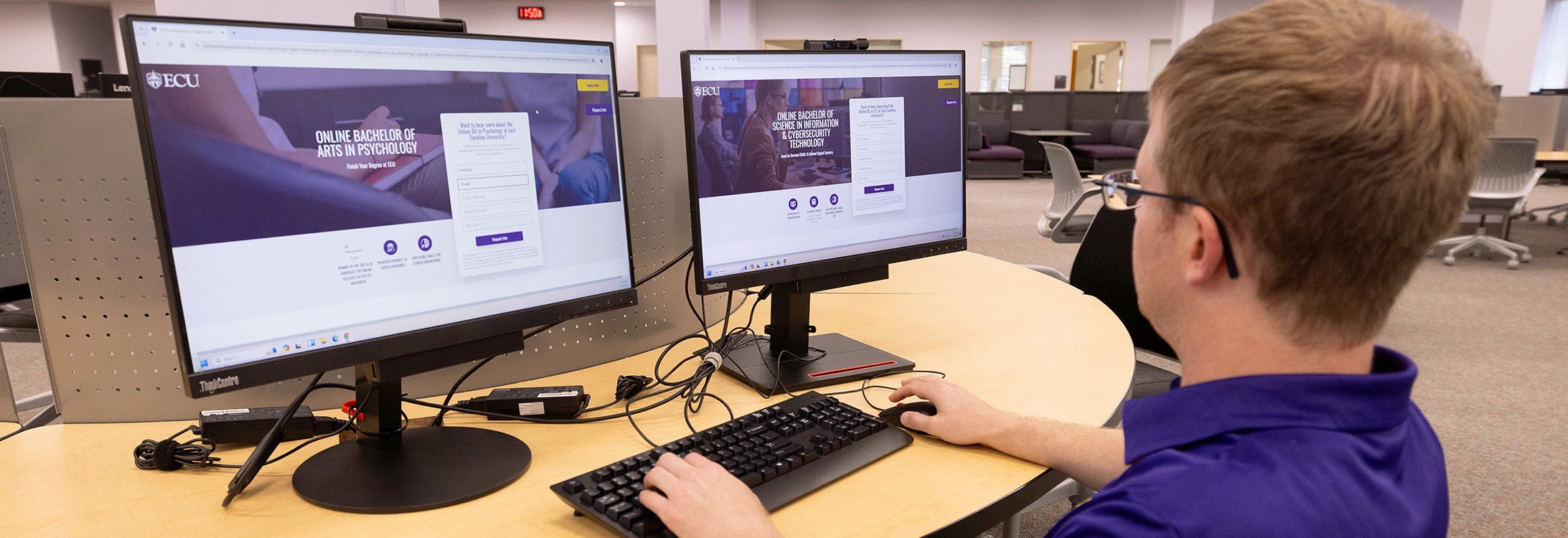Project Kitty Hawk enhances brand of ECU online programs

ECU psychology major Sarah Williams works on coursework on her laptop. She has enjoyed her experience taking classes online at ECU through Project Kitty Hawk. (Contributed photo)
Sarah Williams had tried online courses at two institutions. Then she found an East Carolina University psychology program powered by Project Kitty Hawk. The strong support and communication she’s receiving as an adult learner in the program trumps her previous experiences.
“The whole team has been amazing,” she said.
ECU has been an established leader in online education for close to three decades, becoming one of the first universities in the nation to deliver degree programs through the internet in the mid-1990s. Project Kitty Hawk is now enhancing that reputation.
“We’re attracting students from across the state who may not have considered ECU,” David Eby, chief operations officer of Project Kitty Hawk, told ECU Board of Trustees committee members earlier this year. “… We’re expanding who ECU learners are.”
The mission of Project Kitty Hawk is to partner with UNC System institutions to solve workforce needs throughout the state by building high demand degree programs and by providing student support solutions specifically tailored for nontraditional learners. Four ECU programs are part of the Project Kitty Hawk lineup:
- Bachelor of Science in information and cybersecurity technology (ICT) through the Department of Technology Systems in the College of Engineering and Technology;
- Bachelor of Science in criminal justice through the Department of Criminal Justice and Criminology in the Thomas Harriot College of Arts and Sciences;
- Bachelor of Science in multidisciplinary studies with a concentration in security studies through the Department of Political Science in the Thomas Harriot College of Arts and Sciences;
- Bachelor of Arts in psychology through the Department of Psychology in the Thomas Harriot College of Arts and Sciences.
Eby said plenty of marketing research went into the selection of the initial list of ECU program offerings.
“These are programs that are really in high demand with consumers across the state and employers who are looking for bachelor’s degree programs,” he said.
The UNC System’s goal is to enroll 45,000 undergraduate students over the age of 25 by 2027. Project Kitty Hawk’s goal of 32,500 new system adult learners by 2028 is part of that effort.
“We are well on our way to accomplishing those goals with the partnerships we have today,” Eby said.
Service behind the mission

David Eby, chief operations officer of Project Kitty Hawk, said the goal to bring in 32,500 adult learners to UNC System institutions by 2028 is well under way. (Contributed photo)
Rather than traditional fall and spring semesters with 15-week classes, Project Kitty Hawk offers five semesters — two starting in the fall, two in the spring and one in the summer — with 7 1/2-week online classes that Williams said fits her busy schedule.
“What attracted me to the ECU program is how well everything is communicated,” said Williams, a psychology major. “The faculty is really with you every step of the way … Even though they are teaching other classes, it’s almost as if they’re in the class with us with how fast they get back to us about anything, and that really attracted me to this program because I don’t feel like I’m not being helped. I genuinely feel like I’m in the class with them.”
Williams said the availability of online tutoring provides extra support.
“The way that it’s set up is so easy, and someone is always there,” she said.
Eby said the services that on-campus students need are the same as adult learners.
“They just need them online. They just consume them differently,” he said. “If it’s 7 o’clock at night and you need to talk to a success coach about some of the challenges you’re having in the classroom, we have success coaches — trained, professional success coaches — who talk to these nontraditional students about any challenges they may be having.”
Eby said those services begin quickly, within the first 5 to 7 minutes a potential student reaches out to them with an inquiry.
“We think about that student experience from the very first point when they are going on Google and typing in online degree programs in North Carolina,” he said.
Dr. Page Varnell, teaching assistant professor in the Department of Technology Systems, is the coordinator of the ICT program. She said ECU and Project Kitty Hawk have worked together to give adult learners as much of an on-campus experience as possible.
“One of the things I wanted to make sure we had was some type of communication tool with our online students because it’s important to me that they get a similar experience,” Varnell said. “We came up with this common program area that we’re going to have in Canvas so that when we have guest speakers on Canvas, they can join remotely, or they can attend our club meetings. For the students who want to attend remotely, they can, so we’re trying to provide that bridge.”
Quality education

Dr. Allen Guidry, associate provost of learner operations at ECU, speaks about Project Kitty Hawk to ECU Board of Trustees committee members. (Photo by Rhett Butler)
Varnell understands the importance a college degree can have for students. Career advancement and higher pay can set the stage for life fulfillment for students and their families. Providing a quality education, whether online or in person, is essential to that.
She stresses that the ECU ICT degree available through Project Kitty Hawk is not just a rubber stamp on a piece of paper. The program is just as rigorous with the same requirements and course materials as in-person learning.
That point is not lost on Dr. Allen Guidry, associate provost of learner operations. He sees Project Kitty Hawk as another location where students learn.
“It’s like opening a new campus but in the virtual space,” he said.
He said it’s no surprise that adult learners are looking to East Carolina as compared to out-of-state, for-profit schools that are flooding the airwaves with commercials.
“What we’re finding is that they do really like the brand of ECU,” Guidry said. “It’s something that is resonating with them.”
Project Kitty Hawk operates in the background, providing support and marketing that puts the university out front.
“If we’re doing our job well, no one will know about Project Kitty Hawk,” Eby said.
Project Kitty Hawk is targeting employers that offer tuition assistance, military-affiliated learners and community colleges. With nearly 1,800 program inquiries in the first four months of the year, the efforts are paying off, Eby said.
In the end, Project Kitty Hawk is simply another tool to support ECU online educational opportunities for adult learners, Eby said.
“We want to help ECU continue its excellence in online delivery,” he said.
